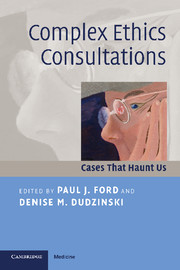Book contents
- Frontmatter
- Contents
- List of contributors
- Foreword
- Acknowledgments
- Introduction: Live and learn: courage, honesty, and vulnerability
- Part I Starting at the beginning: prenatal and neonatal issues
- Part II The most vulnerable of us: pediatrics
- Part III Diversity of desires and limits of liberty: psychiatric and psychological issues
- 9 Helping staff help a “hateful” patient: the case of TJ
- 10 Ulysses contract
- 11 Misjudging needs: a messy spiral of complexity
- 12 When the patient refuses to eat
- Part IV Withholding therapy with a twist
- Part V The unspeakable/unassailable: religious and cultural beliefs
- Part VI Human guinea pigs and miracles: clinical innovations and unorthodox treatment
- Part VII The big picture: organizational issues
- Conclusions, educational activities, and references
- Index
10 - Ulysses contract
Published online by Cambridge University Press: 03 May 2010
- Frontmatter
- Contents
- List of contributors
- Foreword
- Acknowledgments
- Introduction: Live and learn: courage, honesty, and vulnerability
- Part I Starting at the beginning: prenatal and neonatal issues
- Part II The most vulnerable of us: pediatrics
- Part III Diversity of desires and limits of liberty: psychiatric and psychological issues
- 9 Helping staff help a “hateful” patient: the case of TJ
- 10 Ulysses contract
- 11 Misjudging needs: a messy spiral of complexity
- 12 When the patient refuses to eat
- Part IV Withholding therapy with a twist
- Part V The unspeakable/unassailable: religious and cultural beliefs
- Part VI Human guinea pigs and miracles: clinical innovations and unorthodox treatment
- Part VII The big picture: organizational issues
- Conclusions, educational activities, and references
- Index
Summary
Case narrative
Jimmy was a 24-year-old man who experienced a spinal cord injury at C-3 from a gunshot wound during a drug deal two years ago, resulting in quadriplegia. Following the initial acute-care episode and a stay in a rehabilitation facility he was transferred to a nursing home for long-term care. He was cognitively intact, ventilator dependent, and had developed multiple pressure ulcers (sacrum, heel, calf). He had a diverting colostomy and suprapubic bladder catheter. He had had a percutaneous gastrotomy (PEG) tube inserted during the initial acute hospitalization. Although he was able to eat, tube feedings were used as needed to supplement his oral intake and to assure adequate nutrition. He was able to exhale sufficient air around his tracheostomy to whisper short sentences.
Jimmy had no siblings. His mother lived in another city and visited infrequently. He had several friends who remained in contact with him for the first year after his injury but who no longer visited or called.
Jimmy intermittently refused to allow dressings on his pressure ulcers to be changed. The prescribed routine included daily dressing changes to the deep sacral wound and every other day changes of moisture-barrier dressings on his heel and calf ulcers. The sacral pressure ulcer covered the entire area of one buttock and extended part of the way across the top of the other buttock. It was a stage 4 wound, with persistent infection. A foul odor was evident in his room when Jimmy refused to allow wound care. Jimmy had to be turned completely on his side to provide access to the wound so the dressing could be changed. This required packing with sterile dressings and covering.
- Type
- Chapter
- Information
- Complex Ethics ConsultationsCases that Haunt Us, pp. 81 - 87Publisher: Cambridge University PressPrint publication year: 2008



